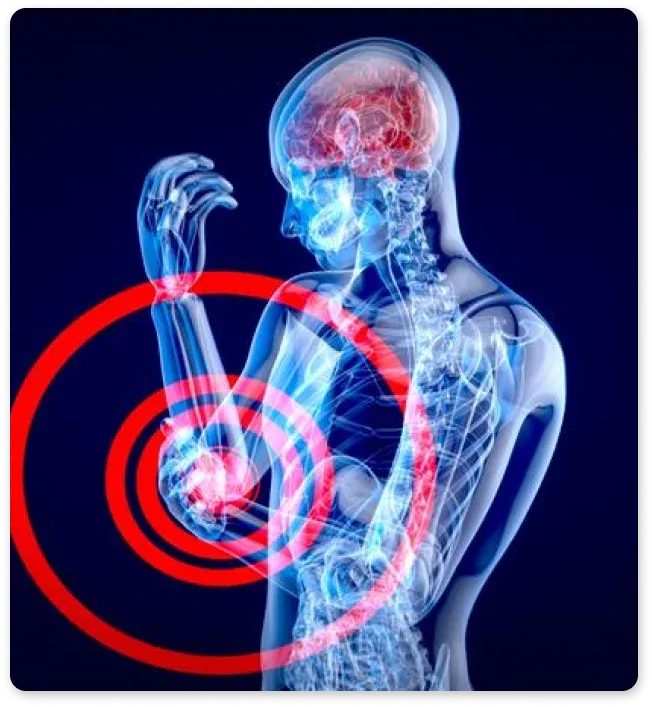
Professional Expertise
Our in-house endocrinologist is ready to help revive your healing journey despite the wide and complex nature of endocrine disorders and dysfunctions.
Osteoporosis and Electrolyte
Osteoporosis and Electrolyte
Osteoporosis and electrolyte imbalances are two critical health issues that are different but interconnected in ways that can make well-being worse overall. Both conditions can profoundly affect your health, and understanding their relationship is very important to effective management and treatment. We will discuss the complexities of osteoporosis and electrolyte problems, their interconnections, and how you can manage them for better health outcomes.
Osteoporosis:
Osteoporosis is a bone disorder in which bones become weaker and more vulnerable to fractures and breaks. The disease is often called a "silent" condition because it progresses without noticeable symptoms until a fracture occurs. Osteoporosis primarily affects older adults, particularly postmenopausal women, but it can also occur in men and younger individuals.
"An estimated 53 million Americans either carry a diagnosis of osteoporosis or are at risk for fracture due to decreased bone mass."

https://www.ncbi.nlm.nih.gov/pmc/articles/PMC9359008/
The primary cause of osteoporosis is the loss of bone density. Several factors add to this imbalance. These factors include, first of all, hormonal changes that affect women after menopause; they experience a significant drop in estrogen levels, accelerating bone loss. Men also experience gradual testosterone (male hormones) declines, which can affect bone health. If you have a family history of osteoporosis, it can increase the risk of developing this condition. Inadequate intake of calcium and vitamin D can result in decreased bone density. Calcium is essential for bone formation, while vitamin D aids calcium absorption. People with a sedentary lifestyle, smokers, and those who consume excessive alcohol can hurt bone health. Additionally, certain medications and diseases, such as rheumatoid arthritis or malabsorption disorders, can lead to bone loss.
Osteoporosis often exhibits no symptoms until a fracture arises, commonly involving the spine, hip, and wrist. Diagnostic tools include:
- Bone Density Test: Measures bone mineral density to assess the risk of fractures.
- Bone Turnover Markers: Blood tests that indicate the rate of bone resorption and formation.
Electrolyte Imbalances:
Electrolytes are vital minerals present in blood and body fluids. They carry an electric charge and are crucial for various bodily functions, including nerve signaling, muscle contraction, and fluid balance. Common electrolytes include sodium, potassium, calcium, magnesium, chloride, and bicarbonate.
Electrolyte imbalances occur when the levels of these minerals in the body are too high or too low. These imbalances can arise from various causes, leading to multiple symptoms and health issues. Insufficient or excessive intake of electrolytes through food or supplements can lead to imbalances. Also, excessive fluid loss due to vomiting, diarrhea, or sweating can disturb electrolyte levels. The kidneys play the most important role in regulating electrolyte levels. Conditions affecting kidney function can also lead to imbalances. Remember that some medications, like diuretics or laxatives, can change your electrolyte levels. Conditions like diabetes, adrenal disorders, or gastrointestinal diseases can impact electrolyte balance.
Symptoms of electrolyte imbalances vary depending on which electrolyte is affected. Common symptoms include:
- Hyponatremia (low sodium): Headache, nausea, confusion, and seizures.
- Hyperkalemia (high potassium): Muscle weakness, fatigue, palpitations, and, in severe cases, cardiac arrest.
- Hypocalcemia (low calcium): Muscle cramps, tingling, and seizures.
- Hypercalcemia (high calcium): Nausea, vomiting, confusion, and kidney stones.
Diagnosis typically involves blood tests to measure electrolyte levels and identify any imbalances. Kidney function tests may also be conducted.
The Intersection of Osteoporosis and Electrolyte Imbalances
The relationship between osteoporosis and electrolyte imbalances is significant. Electrolytes, particularly calcium, play a critical role in bone health. Here's how these two conditions intersect:
Calcium:
"Maintaining strong, healthy bones requires the crucial role of calcium." In osteoporosis, the body's ability to absorb and retain calcium may be compromised, leading to reduced bone density. This is particularly concerning because osteoporosis makes bones more fragile and at risk of fractures. Chronic low calcium levels can accelerate bone loss and increase fracture risk. In individuals with osteoporosis, calcium intake is crucial to help slow down the progression of bone loss and support bone health.
The body regulates calcium levels through dietary intake and bone resorption. If calcium intake is insufficient, the body may draw calcium from bones, weakening them. Maintaining adequate calcium levels is essential for individuals with osteoporosis to lessen further bone loss.
Magnesium:
Magnesium is an essential electrolyte for bone health. It plays a role in bone formation and regulates calcium levels in the body. Magnesium deficiency has been linked to decreased bone density and an increased risk of osteoporosis. Low magnesium levels can impair the body's absorption of calcium and may contribute to bone loss. Ensuring sufficient magnesium intake through diet or supplements can benefit bone health.
Potassium:
Potassium helps maintain bone health by neutralizing acids in the body that can filter calcium from bones. A diet high in potassium-rich foods like fruits and vegetables can help support bone health and reduce the risk of osteoporosis.
Both high and low potassium levels can affect bone health. Low potassium levels can contribute to bone loss, while excessively high levels may lead to other health complications. Maintaining balanced potassium levels is essential for overall health and bone integrity.

Managing Osteoporosis and Electrolyte Imbalances:
Effective management of both osteoporosis and electrolyte imbalances involves a multi-faceted approach:
Nutritional Interventions:
- **Calcium:** If necessary, we should ensure adequate calcium intake through dietary sources (e.g., dairy products, leafy greens) or supplements. Recommended daily allowances vary by age and sex, so consult with R-endocrinology to determine the right amount for you. - **Vitamin D:** Vitamin D is essential for calcium absorption. Sun exposure and vitamin D-rich foods (e.g., fatty fish, fortified dairy) can help maintain adequate levels. - **Magnesium and Potassium:** Include magnesium-rich foods (e.g., nuts, seeds, whole grains) and potassium-rich foods (e.g., bananas, oranges) in your diet. Keep this in mind that a balanced diet is crucial for maintaining strong bones and avoiding electrolyte imbalances.
Regular Monitoring and Testing: Regular DEXA scans can monitor bone health, and periodic blood tests can track electrolyte levels.
Lifestyle Modifications: - Engage in weight-bearing exercises like walking or resistance training. - Stay properly hydrated and limit smoking and alcohol consumption.
Medical Management: - Medications: Schedule virtual follow-ups for managing osteoporosis or correcting electrolyte imbalances. - Consult Healthcare Providers: Regular consultations with endocrinologists, dietitians, and nephrologists can help tailor a treatment plan.
Conclusion
Osteoporosis and electrolyte imbalances are significant health issues that can impact overall well-being. Understanding the relationship between these two conditions and effectively managing them is crucial for maintaining bone health and preventing complications. By focusing on proper nutrition, regular monitoring, lifestyle modifications, and medical management, you can support your bone health and maintain balanced electrolytes, improving your quality of life.
If you suspect you have osteoporosis or an electrolyte imbalance, or if you have concerns about your bone health or electrolyte levels, consult with an endocrinologist to create a personalized management plan to maintain optimal health and well-being.
contact us
Get in Touch with us

Make an Appointment
Book Your Online Consultation Now
Manage your endocrine disorders without the hassle of visiting in person. Receive timely consultations without long waiting times and improve your health.



